After hosting the 2018 World Cup, which was generally regarded as a success both on and off the pitch after reaching the quarter-finals and swatting aside all pre-tournament concerns regarding their suitability as a host nation, Russia switch their attention to Euro 2020 this summer.
After surprisingly reaching the semi-finals at Euro 2008, Russia will be hoping to improve on subsequent group-stage exits in both 2012 and 2016 this time around.
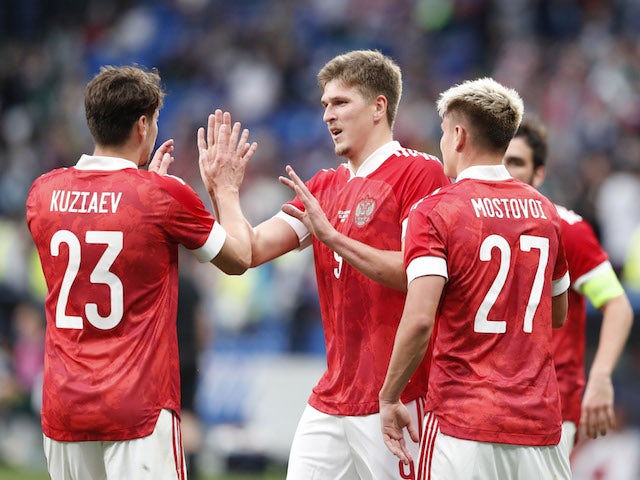 © Reuters
© Reuters
Given that they will have home advantage on their side once again for two of their three group-stage matches, which are set to be played in Saint Petersburg, they will feel confident of doing so, particularly with three teams progressing from four of the six groups.
Sbornaya have never won the European Championship in their current guise as the Russian Federation, although the Soviet Union were champions in 1960 and runners-up in 1964, 1972 and 1988, so they clearly hold historical pedigree in this competition.
For Stanislav Cherchesov and his players, the aim is likely to be to progress from the group stages and see how things develop from there. Here, Sports Mole assess their chances of achieving that and potentially more.
GROUP
Russia qualified as second seeds for Euro 2020, and have been paired with Belgium from the batch of top seeds. Denmark and Finland join them as potentially tricky opponents in Group B.
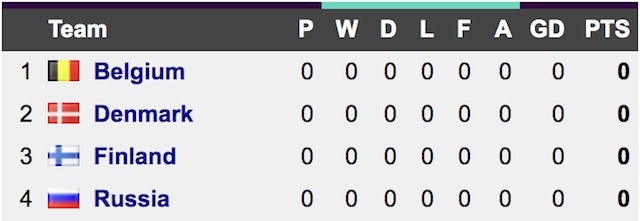
Roberto Martinez's Belgium are heavy favourites to progress as group winners, with the Danes marginally favoured to pip Russia to second spot.
However, as mentioned, the four third-placed teams with the highest amount of points will join the 12 group winners and runners-up in the first knockout stage, so if Russia can beat Finland as they will be expected to, they will have a decent chance of progressing from the group regardless of how they fare against Belgium and Denmark.
FIXTURES
June 12: Russia vs. Belgium (8pm, Saint Petersburg Stadium, St. Petersburg)
June 16: Russia vs. Finland (2pm, Saint Petersburg Stadium, St. Petersburg)
June 21: Denmark vs. Russia (8pm, Parken Stadium, Copenhagen)
HOW THEY QUALIFIED
Having automatically qualified for World Cup 2018 as the host nation, Russia had to go through the usual qualifying process to make it to Euro 2020.
Funnily enough, they were also paired with Belgium in Group I of their qualifying campaign, with the Belgians superbly winning all 10 of their matches to top the group.
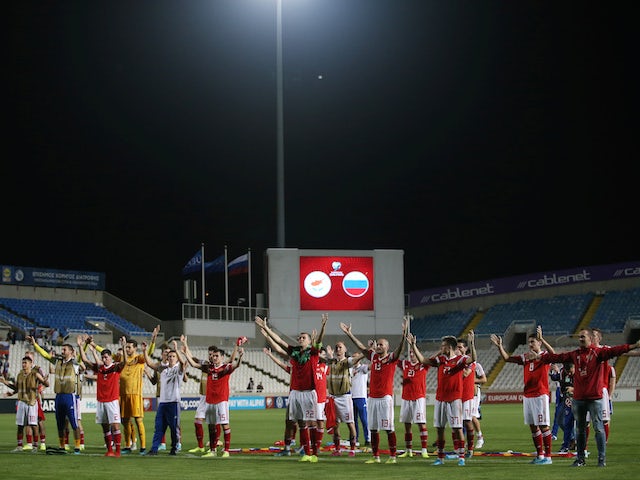 © Reuters
© Reuters
However, Russia won all eight of their other matches to comfortably finish second, beating Scotland, Cyprus, Kazakhstan and San Marino both home and away.
Having scored in both defeats to Belgium, this meant that Cherchesov's side impressively managed to find the back of the net in all 10 of their group matches.
With seven clean sheets notched up along the way, too, there were not too many sides who could boast better Euro 2020 qualification campaigns, even if it could be argued that their group was one of the easier ones.
RECENT FORM
Since the European Championship qualifiers ended more than 18 months ago, Russia's form has been relatively disappointing, with Cherchesov's side winning only five of their 13 matches during that timeframe.
After decent wins against Serbia and Hungary in their first two matches following the COVID-19 pandemic, Sbornaya proceeded to go on a winless run of six games.
 © Reuters
© Reuters
However, they have bounced back by winning three of their five matches in 2021, drawing 1-1 with Poland and beating Bulgaria in their two warm-up friendlies ahead of Euro 2020.
The 1-0 win against the Bulgarians was Russia's first clean sheet since a 0-0 draw with Moldova in November, but it remains to be seen whether Cherchesov can improve his side's defensive record against stronger nations such as Belgium and Denmark.
SQUAD
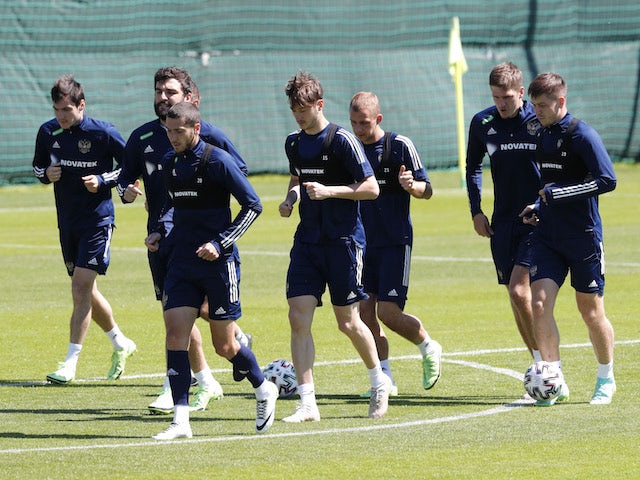 © Reuters
© Reuters
Goalkeepers: Yuri Dyupin (Rubin Kazan), Matvei Safonov (Krasnodar), Anton Shunin (Dinamo Moscow)
Defenders: Georgi Dzhikiya (Spartak Moscow), Igor Diveev (CSKA Moscow), Yuri Zhirkov (Zenit St Petersburg), Vyacheslav Karavaev (Zenit St Petersburg), Fedor Kudryashov (Antalyaspor), Andrei Semenov (Akhmat Grozny), Mario Fernandes (CSKA Moscow)
Midfielders: Dmitri Barinov (Lokomotiv Moscow), Rifat Zhemaletdinov (Lokomotiv Moscow), Maksim Mukhin (CSKA Moscow), Aleksandr Golovin (Monaco), Daniil Fomin (Dinamo Moscow), Roman Zobnin (Spartak Moscow), Alexei Ionov (Krasnodar), Daler Kuzyayev (Zenit St Petersburg), Andrei Mostovoy (Zenit St Petersburg), Magomed Ozdoev (Zenit St Petersburg), Denis Makarov (Rubin Kazan), Aleksei Miranchuk (Atalanta), Denis Cheryshev (Valencia)
Forwards: Artem Dzyuba (Zenit St Petersburg), Anton Zabolotny (CSKA Moscow), Aleksandr Sobolev (Spartak Moscow)
STAR PLAYER - ARTEM DYUBA
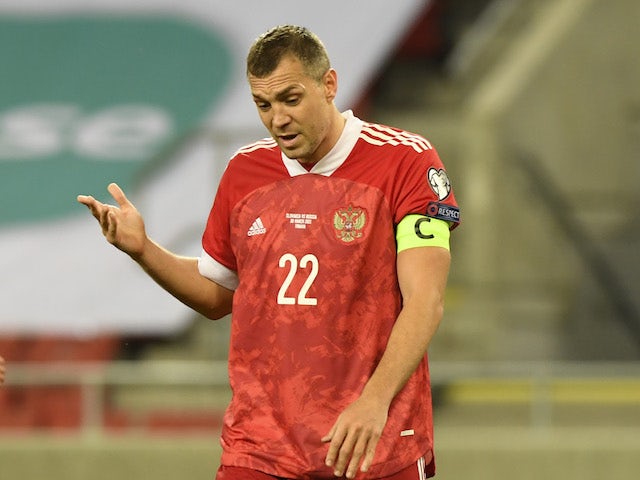 © Reuters
© Reuters
Russia have several technically proficient players who are easier on the eye than Artem Dzyuba, such as Mario Fernandes, Aleksandr Golovin and Denis Cheryshev, but the 6ft 6in 32-year-old is the only player in Cherchesov's squad who can be relied upon to regularly hit the back of the net.
Dzyuba's tally of 29 goals in 52 caps and counting is more than double that of anyone else in Russia's squad, with three of those strikes coming at the 2018 World Cup and nine more during Euro 2020 qualifying. Only five players, including Harry Kane and Cristiano Ronaldo, scored more than that.
Twenty goals in 27 league matches for Zenit last season was a career best campaign for Dzyuba, too, so he is clearly showing no signs of slowing down despite his advancing years. While his size and aerial prowess is perhaps his main asset, Dzyuba possesses a thunderous strike on either foot, making him very difficult for defenders to deal with.
Should the likes of Fernandes, Golovin and Cheryshev turn up in a creative sense, expect Dzyuba to get himself among the goals again for a second successive major international tournament and fire Russia towards their aims for the tournament.
MANAGER - STANISLAS CHERCHESOV
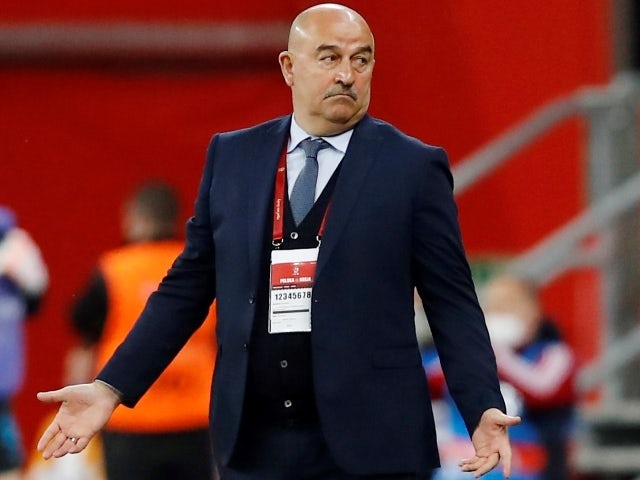 © Reuters
© Reuters
Cherchesov had enjoyed a modest managerial career at club level before being appointed as Russia's third manager in little over a year in August 2016.
A league and cup double at Polish side Legia Warsaw in the 2015-16 campaign was largely what landed the 57-year-old his dream job, having previously failed to win any trophies during relatively short-lived spells at Spartak Moscow, Dynamo Moscow and numerous other clubs.
However, he has thrived as a national team coach, attaining a decent 42% win rate during his 52 matches in charge of his nation of birth. His legacy is already secure having guided Russia to a perfectly respectable home campaign by reaching the quarter-finals in 2018, although he will not want to stop there.
Cherchesov made 47 appearances combined for the Soviet Union, CIS and Russia national teams during his playing career as a goalkeeper, representing Russia at both the 1994 World Cup and Euro 1996.
EUROPEAN CHAMPIONSHIP RECORD
Best finish: Winners (1960)
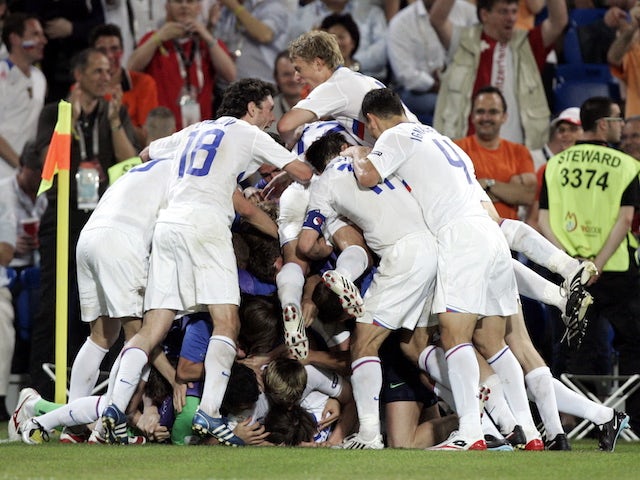 © Reuters
© Reuters
Russia were formidable as the Soviet Union in the early years of the European Championships, winning the first ever rendition of the competition in 1960 by beating Yugoslavia 2-1 after extra time in the final that year.
They also lost three times in the final to Spain, West Germany and the Netherlands in 1964, 1972 and 1988 respectively, with Marco van Basten's sublime volley in the latter final undoubtedly one of the most famous goals in footballing history.
Having finished fourth at Euro 1968, too, the Soviet Union had an incredible record of reaching at least the semi-finals at all five of the European Championships they ever qualified for.
However, in the five which they have qualified for as Russia since, they have only progressed past the group stage once, when Andrey Arshavin inspired them to reach another semi-final before losing 3-0 to eventual winners Spain.
PREDICTION
Belgium should comfortably top Group B, with Finland likely to be a little short on quality, so much could hinge on Russia's final group match against Denmark in Copenhagen.
Four points should almost certainly prove enough to qualify for the first knockout stage as one of the stronger third-placed teams at worst, so if Cherchesov's side can beat Finland and avoid defeat against the Danes, they should have another knockout stage to look forward to, albeit one which we feel is likely to be short-lived.
VERDICT: Last 16








